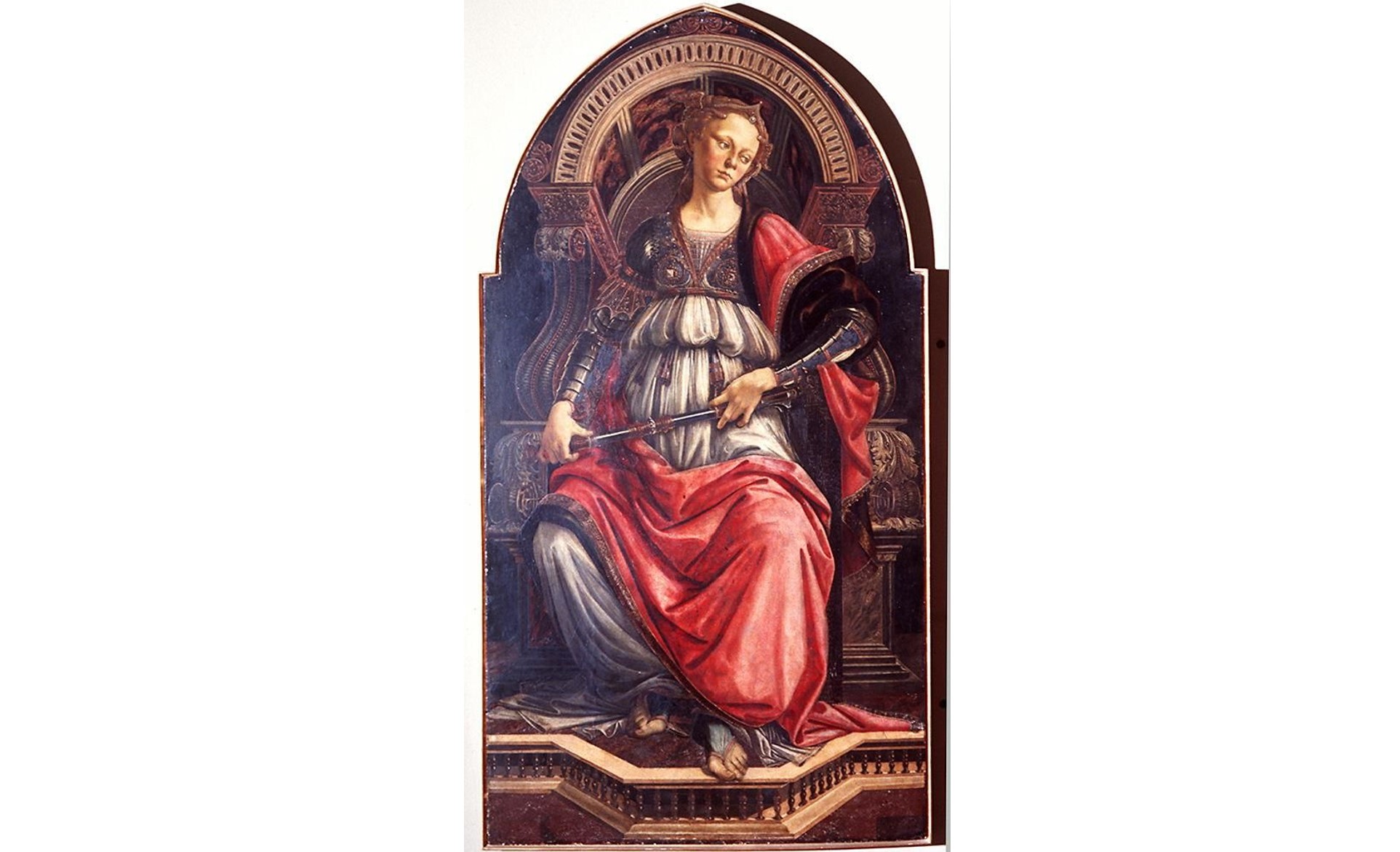+39 0669887260 | info@wucwo.org | Contact us
Art for meditation - April 2024

Sandro Botticelli (Florence 1445 - 1510), The Fortitude, 1470, tempera grassa on panel, 167 x 87 cm, Florence, Uffizi Museum
The Virtues: The Fortitude.
With the month of April, our journey of discovery of the virtues takes a step forward and we enter the first of the so-called 'cardinal' virtues, namely the Fortitude. If we open the Catechism of the Catholic Church, it tells us that " Human virtues are firm attitudes, stable dispositions, habitual perfections of intellect and will that govern our actions, order our passions, and guide our conduct according to reason and faith. They make possible ease, self-mastery, and joy in leading a morally good life. the virtuous man is he who freely practices the good. The moral virtues are acquired by human effort. They are the fruit and seed of morally good acts; they dispose all the powers of the human being for communion with divine love. " (No. 1804).
In particular, "Four virtues play a pivotal role and accordingly are called "cardinal"; all the others are grouped around them. They are: prudence, justice, fortitude, and temperance" (n. 1805).
The representation of the virtue of Fortitude is part of the same cycle that we have examined so far, although it presents some important differences. Indeed, this is the only panel that was not painted by Piero del Pollaiolo. The commission to the young Botticelli seems to be the fruit of what we might today call a 'recommendation' done by Tommaso Soderini, one of the workers in charge of supervising the execution of this cycle and who was part of a political circle linked to the Medici to which Botticelli himself was also affiliated. From a technical point of view, then, the panel is on poplar wood (and not cypress as the other six painted by Pollaiolo). The marble stool on which the Fortress sits is also different from those seen so far, because it is much richer in inlays.
The young woman is depicted clad in armour and holding a sceptre of command. Although the attributes with which the Fortress is presented have a military character, we understand that this is only a symbolic reference. The softness of the robes, the elegance of the red cloak, the calmness of the gaze, the elaboration of the hairstyle, can make one think of anything except violence or war. Rather, they make the young woman allude to the strength and perseverance needed to pursue the good.
Fortitude is the moral virtue that ensures firmness in difficulties and constancy in the pursuit of the good. It strengthens the resolve to resist temptations and to overcome obstacles in the moral life. the virtue of fortitude enables one to conquer fear, even fear of death, and to face trials and persecutions. It disposes one even to renounce and sacrifice his life in defense of a just cause. "The Lord is my strength and my song."(Wis 8:7) "In the world you have tribulation; but be of good cheer, I have overcome the world." (Prov 14:15)
David sang the words of this song to the LORD when the LORD had rescued him from the grasp of all his enemies and from the hand of Saul. This is what he sang: I "O LORD, my rock, my fortress, my deliverer, my God, my rock of refuge! My shield, the horn of my salvation, my stronghold, my refuge, my savior, from violence you keep me safe. 'Praised be the LORD,' I exclaim, and I am safe from my enemies.(2 Sam.22,1-4)
"In you, O LORD, I have taken refuge; let me never be put to shame; In your righteousness deliver me. Incline your ear to me, make haste to rescue me! Be my rock of refuge, a stronghold to save me. For you are my rock and my fortress; for your name’s sake lead me and guide me” (Ps 31. 1-3). But He [the Lord] said to me, "My grace is sufficient for you, for power is made perfect in weakness." I will rather boast most gladly of my weaknesses, in order that the power of Christ may dwell with me. Therefore, I am content with weaknesses, insults, hardships, persecutions, and constraints, for the sake of Christ; for when I am weak, then I am strong.(Cor. 12. 9-10)
(Contribution by Vito Pongolini)